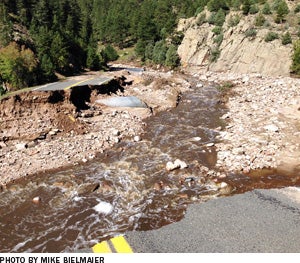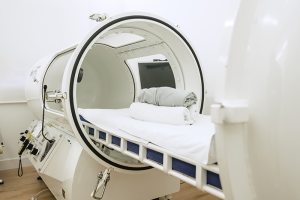Surviving flood, isolated hospital braces for winter

The torrential rains and flash flooding that severely damaged parts of Colorado only two months ago may seem like ancient history. But for the staff who are trying to keep Estes Park Medical Center operating efficiently and whose lives have been disrupted, every day is a reminder.
Severe rains in September forced part of Estes Park to evacuate, and washed out large stretches of most roads that lead into town, causing the hospital to get creative with basic needs for staff.
One road into Estes Park remains drivable, but it is a circuitous route down the mountain that turns a 45-minute trip into a few hours for patients who need additional care at hospitals in the larger towns of Longmont and Loveland and for staff who live there, says Bobbi Swenson, interim CEO at the medical center.
Estes Park, with a population of about 12,000, is located at the base of Rocky Mountain National Park. There's no local airport, but there is a helipad at the hospital when a chopper becomes available to transfer patients to larger hospitals in towns down the mountainside. It also has five ambulances at its disposal, if not always the staff to operate them at one time.
Swenson calls the looming transportation challenges "highly concerning" as the inevitable snow nears.
The medical center shuttles staff who live in towns outside Estes Park and provides shelter and free meals at local housing it owns, so staff can stay in town for stretches at a time.
Staff who live in town also share their homes with colleagues, so they don't have to commute down the mountain. The hospital is helping in other ways, too. "We just rolled out an employee assistance fund, so people can donate money or clothing to employees," Swenson says.
As for rebuilding the roads, the state has assured the town that one highway with the least damage will be reopened Dec. 1, but that could mean a one-lane gravel road for now. Permanent work on other roads leading into Estes Park is not expected to begin until spring.




